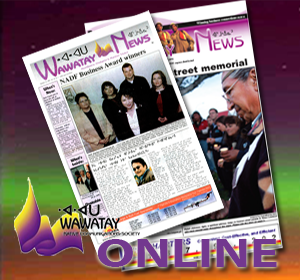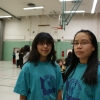From mining to education to language loss, the Treaty #3 youth executive council had a lot of ground to cover when it met with Ontario’s minister of Aboriginal Affairs.
By all accounts, both sides came away satisfied by the three-hour meeting.
“It’s good for her to get the youth point of view,” said Rayanna Seymour, a member of the youth executive council. “It’s really important that she got to hear us. We grew up with these issues, and now she’ll know more of the background behind what her job is all about.”
Kathlene Wynne, Ontario’s Aboriginal Affairs minister, said she left the meeting impressed by the breadth of knowledge displayed by the youth.
“Young people are thinking deeply about these issues,” Wynne said.
Seymour, 20, and the other six members of the youth executive council brought a list of concerns to the meeting. Paramount was education – including the difference in funding between on-reserve and off-reserve schools and the challenges facing youth who have never left their reserve when it comes time to consider post-secondary education.
Seymour said she wanted to make the minister aware of her personal situation with post-secondary education: how she had to wait a full year after high school to go to university because of a funding list backlog, and how the funding available for students has left her scraping by on a second job while trying to complete her studies.
“There is such a limited number of Aboriginal students who go to (post-secondary) school,” Seymour said. “Don’t you think the government would want us to grow and succeed, and give us as much funding as possible to go to school?”
The meeting also brought up the loss of traditional languages. Seymour said a Treaty #3 Elder who attended the meeting said a prayer and opening statement in Ojibwe, a language none of the youth council speak.
“That is a big thing,” she said. “It was kind of sad, the Elder speaking in our language but none of us could understand.”
As a contrast, one member of the youth council speaks French from his time in French immersion school. Seymour said the youth council agreed that Aboriginal language instruction in schools needs an overhaul.
The youth council also proposed an exchange program for First Nations youth living on reserve, to have them spend time in the summer in a different Canadian town or city to give them exposure to life off reserve.
For Wynne, the discussions on mining and the future uses of traditional lands resonated long after the meeting was over.
She said the youth brought up their concerns with how industry comes into traditional territory, and how discussions between industry, First Nations and the provincial government need to be facilitated.
“They made it clear that government has a role to play,” Wynne said. “(The youth) want a future where the land is preserved and protected, but they also want economic opportunities.
“There needs to be more recognition on both sides, and a partnership conversation between First Nations and the government,” she added.
In terms of building a partnership, the meeting was a good start, Seymour said. She said the youth know Wynne is only one person in a large government, and that she cannot deal with all the issues on her own. But they want to be sure that their voices are heard, respected and considered when decisions get made.
“She is the minister of Aboriginal Affairs, and we’re the Treaty #3 youth,” Seymour said. “Our ideas will grow as we learn more and more each day, and we’re going to always be here. It is really important that she hear us, and that she knows how we feel about these issues surrounding us, since we’re the future leaders and we’ll have these same issues when we’re older.”
I am the product, evolution of many thousands of years as are you.









I am the product, evolution of many thousands of years as are you. I grew up on the land in the remote far north of Ontario following in the footsteps of my...
One of the most beautiful serene places I’ve ever visited was on the banks of the Opinagau River in northern Ontario, just near the corner of land where...